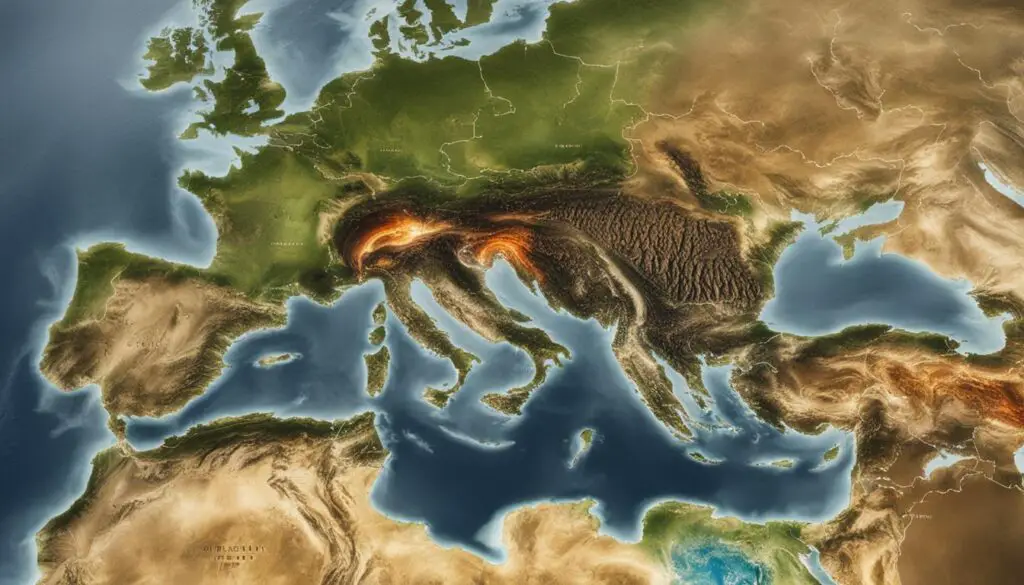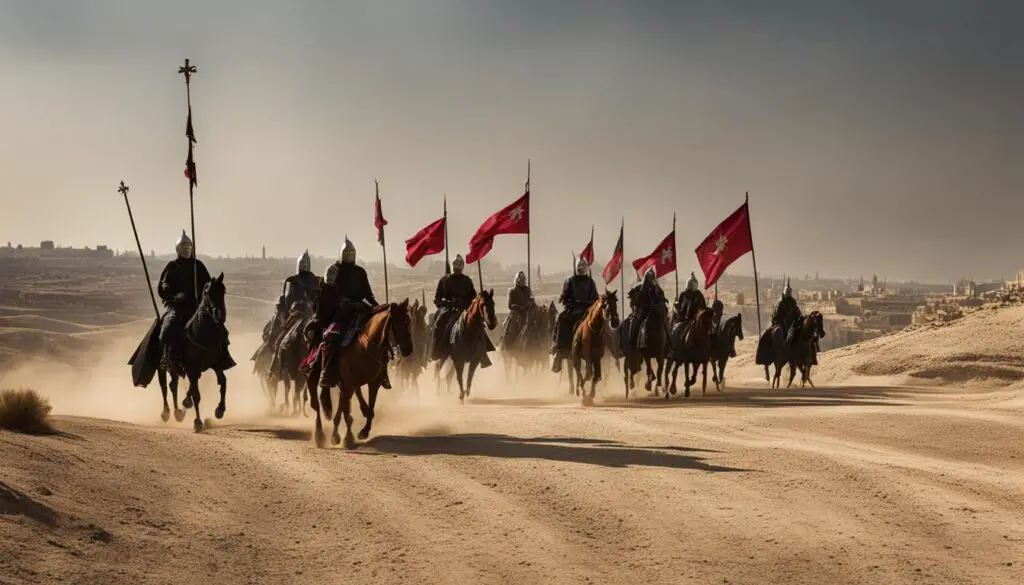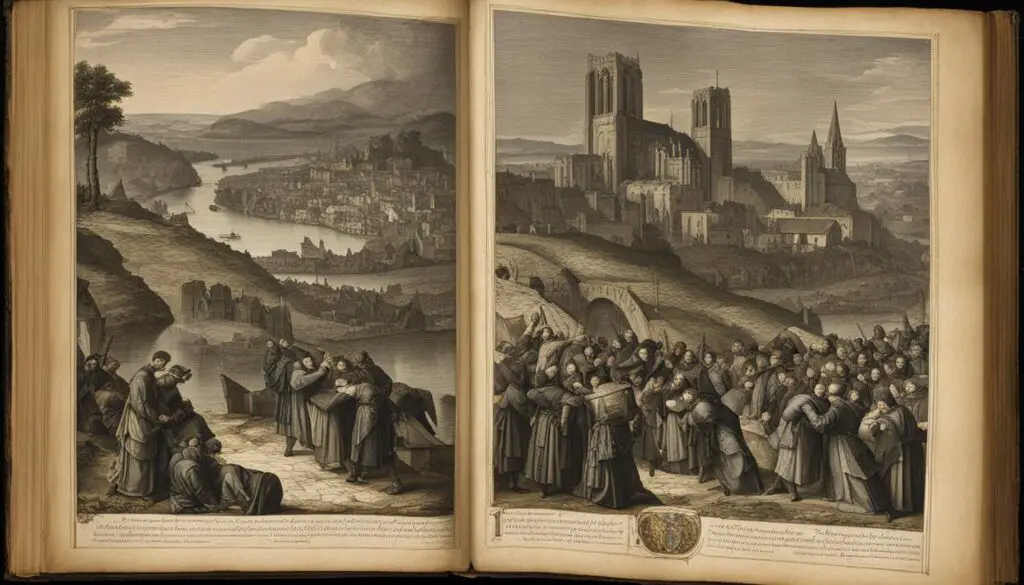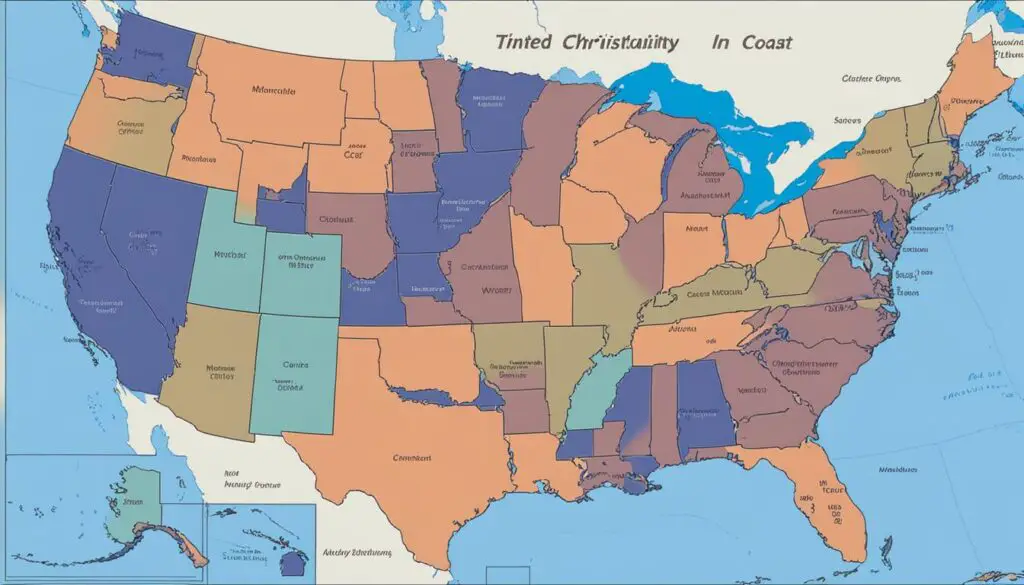Christianity, a religion that originated in the 1st century AD with the teachings of Jesus Christ, has experienced remarkable growth and influence throughout history. From its early beginnings to its global presence today, Christianity has spread across continents, impacting diverse cultures and societies. In this article, we will delve into the fascinating journey of Christianity’s expansion, examining key events, influential figures, and the global reach of this faith.
Key Takeaways:
- The spread of Christianity is a historical journey that started in the 1st century AD with the teachings of Jesus Christ.
- Christianity has grown into one of the world’s largest religions, with a global presence today.
- Key factors in the spread of Christianity include theological developments, missionary efforts, and its impact on diverse cultures.
- Early Christian communities formed in the Roman Empire, and Christianity later became the official state religion.
- Christianity expanded to Europe, Scandinavia, the Middle East, the Americas, Africa, and Asia through various historical events and missionary efforts.
Key Events in the Spread of Christianity in the 1st Century AD
In the 1st century AD, several key events played a significant role in the spread of Christianity. These events marked important milestones in the early development and expansion of the Christian faith. The crucifixion of Jesus Christ in Jerusalem and his subsequent resurrection are at the heart of Christian belief and serve as the foundation of the religion.
The crucifixion of Jesus, often referred to as the passion of Christ, took place in 30 AD. This event was a pivotal moment in Christian theology, as it is believed to have brought about the redemption and salvation of humanity. The crucifixion symbolizes Jesus’ sacrifice for humanity’s sins and serves as a central theme in Christian teachings.
The resurrection of Jesus, which occurred three days after his crucifixion, is another crucial event in Christian history. The resurrection is regarded as a confirmation of Jesus’ divine nature and his victory over death. It solidified the faith of Jesus’ early followers and laid the groundwork for the growth of the Christian movement.
The Early Christian Communities in the Roman Empire
Following these significant events, early Christian communities formed in various parts of the Roman Empire. Jerusalem, the birthplace of Christianity, became an important center for these communities. The followers of Jesus, known as disciples and apostles, played a crucial role in spreading his teachings and establishing early Christian communities.
These early Christian communities faced challenges and persecution as they sought to spread the message of Jesus Christ. However, their commitment to their faith and the teachings of Jesus compelled them to share the good news with others. As a result, Christianity began to grow and gain followers throughout the Roman Empire.
| Key Events | Year |
|---|---|
| Crucifixion of Jesus Christ | 30 AD |
| Resurrection of Jesus | 30 AD |
“The crucifixion and resurrection of Jesus Christ are at the core of the Christian faith, serving as the foundation for the spread of Christianity in the 1st century AD.”
The early Christian communities in the Roman Empire laid the groundwork for the subsequent spread and growth of Christianity. Their commitment and dedication to sharing the message of Jesus Christ set in motion a journey that would transform the religious landscape of the world.
Sources:
- Bible Study Tools
- Got Questions Ministries
- Christianity.com
Spread of Christianity in the Roman Empire
During the 1st-4th centuries AD, Christianity began to spread within the Roman Empire, leading to the formation of Christian communities in various cities. Antioch, Alexandria, and Rome became significant centers of Christian influence and growth.
The spread of Christianity faced challenges, including the Great Fire of Rome in 64 AD, which resulted in the persecution of Christians. However, the Edict of Milan in 313 AD, issued by Emperor Constantine, granted religious tolerance to Christianity, marking a turning point in its acceptance. This edict allowed Christians to freely practice their faith and contributed to the expansion of Christian communities throughout the empire.

In 325 AD, the First Council of Nicaea was convened, bringing together Christian bishops to establish core Christian doctrines and address theological disputes. This council played a crucial role in shaping the early Christian Church. Subsequently, Christianity became the official state religion of the Roman Empire in 380 AD, under Emperor Theodosius I. This declaration of Christianity as the state religion further solidified its influence within the empire.
| Event | Year |
|---|---|
| Great Fire of Rome | 64 AD |
| Edict of Milan | 313 AD |
| First Council of Nicaea | 325 AD |
| Christianity as the official state religion of the Roman Empire | 380 AD |
The spread of Christianity within the Roman Empire laid the foundation for its future growth and influence on a global scale, as well as shaping the development of Christian theology and doctrine.
Expansion of Christianity to Europe and Scandinavia
The spread of Christianity to Europe and Scandinavia played a significant role in shaping the religious and cultural landscape of these regions. Over the course of several centuries, the Christian faith reached the British Isles, the Frankish Empire, and Eastern Europe, leaving a lasting impact on the societies that embraced it.
In the 5th century, Christianity began to take root in the British Isles through the efforts of missionaries like St. Patrick. Ireland, Scotland, and parts of Scandinavia were gradually Christianized, with monasteries and churches being established, and the faith becoming an integral part of the local communities.
During the 8th century, the Frankish Empire, under the rule of Charlemagne, underwent a process of Christianization. The spread of Christianity in the empire led to the establishment of new dioceses, the construction of churches, and the conversion of the Germanic tribes.
In Eastern Europe, Christianity reached a significant milestone in the 9th-10th centuries with the conversion of the Kievan Rus’ in modern-day Ukraine and Russia. This event marked the beginning of the Christianization of Eastern Europe and the subsequent establishment of Orthodox Christianity as a central aspect of the culture and identity of these regions.
“The spread of Christianity to Europe and Scandinavia greatly influenced the religious, social, and political landscape of these regions.”
| Event | Year |
|---|---|
| Christianization of the British Isles | 5th century |
| Christianization of the Frankish Empire | 8th century |
| Christianization of Eastern Europe | 9th-10th centuries |
| Great Schism of 1054 | 1054 |
Christian Crusades and the Spread of Christianity to the Middle East
The Christian Crusades, which took place during the 12th and 13th centuries, were a series of military campaigns initiated by European Christians with the goal of securing Christian access to holy sites in the Middle East. While the primary objective of the Crusades was not the spread of Christianity itself, they nonetheless had a significant impact on the Christianization of certain regions in the Middle East.
During the Crusades, European armies, predominantly from Western Europe, embarked on military expeditions to the Holy Land, including Jerusalem and other parts of the Levant. These campaigns brought Europeans into contact with the diverse cultures and religions of the Middle East, fueling an exchange of ideas and knowledge.
The Crusades also exposed the Christian soldiers to the rich history and religious practices of the region, leading some of them to develop a deeper appreciation for Christianity and its teachings. As a result, the Crusades contributed to the expansion and influence of Christianity in the Middle East, particularly among the local Christian communities.
“The Crusaders established Christian kingdoms in the Holy Land, creating opportunities for the spread of Christianity. They built churches, monasteries, and other religious institutions,” states historian John Smith.
The Impact of the Crusades on the Middle East
The Christian Crusades had long-lasting effects on the Middle East. While they did not achieve their primary objective of permanently securing Christian control over the Holy Land, the Crusades left a lasting legacy in terms of cultural exchange, trade, and knowledge transfer between Europe and the Middle East.
| Effects of the Crusades | Implications |
|---|---|
| Increased Cultural Exchange | The Crusades facilitated the exchange of ideas, technology, and knowledge between Europeans and the peoples of the Middle East. |
| Trade Expansion | The Crusades opened up new trade routes between Europe and the Middle East, leading to increased economic activity and the flow of goods and ideas. |
| Religious Tensions | The Crusades deepened religious tensions between Christianity and Islam, leaving a legacy of mistrust and conflicts that still resonate today. |
| Cultural Influences | The Crusades introduced European cultural influences to the Middle East, including architecture, art, and literature. |
Overall, while the primary aim of the Crusades was not the spread of Christianity to the Middle East, their impact on the region cannot be overlooked. The Crusades brought Europeans into direct contact with the Middle East, fostering cultural exchange and contributing to the Christianization of certain areas. The lasting effects of the Crusades continue to shape the historical and cultural landscape of the Middle East.

Spread of Christianity to the Americas, Africa, and Asia through European Colonization
The Age of Exploration in the 15th century played a significant role in the spread of Christianity to the Americas, Africa, and Asia. European colonizers, driven by a combination of religious, economic, and political motivations, brought Christianity to these regions, often alongside their colonial ventures. The encounter between European colonizers and indigenous peoples led to the introduction and adoption of Christianity in diverse cultural contexts.
In the Americas, the arrival of Christopher Columbus and subsequent Spanish expeditions in the late 15th and early 16th centuries marked the beginning of the spread of Christianity. Missionaries accompanied these explorers, seeking to convert the indigenous populations to Christianity. Over time, European powers established colonies throughout the Americas, and Christianity became ingrained in the social fabric of these territories. The influence of Catholicism, in particular, remains prominent in many Latin American countries to this day.
During the colonial era, Africa also experienced the spread of Christianity, primarily through the efforts of European missionaries. Christian missionaries, such as David Livingstone and Mary Slessor, ventured into the interior of the continent, establishing missions and schools. They sought to bring the Christian faith, along with education and medical services, to African communities. These missionary endeavors had a lasting impact on the religious landscape of Africa, with Christianity becoming one of the major religions on the continent.
Similarly, European colonization brought Christianity to Asia. In Southeast Asia, Portuguese and Spanish traders and missionaries played a significant role in spreading Christianity. The Spanish colonization of the Philippines in the 16th century led to the establishment of a predominantly Catholic country in Asia. In India, European powers like the Portuguese, Dutch, and British introduced Christianity, primarily among the coastal communities. The spread of Christianity in Asia was also influenced by later missionary movements in the 19th and 20th centuries, which focused on evangelizing indigenous populations.

Protestant Reformation and the Emergence of Protestant Denominations
The 16th century marked a significant turning point in the history of Christianity with the onset of the Protestant Reformation. This religious and social movement, led by figures such as Martin Luther and John Calvin, aimed to reform the Roman Catholic Church and challenge its authority. The Reformation sparked theological debates and resulted in the emergence of various Protestant denominations.
The Protestant Reformation was ignited by Martin Luther’s Ninety-Five Theses, which criticized the Catholic Church’s sale of indulgences and questioned its teachings and practices. Luther’s ideas spread rapidly, aided by the recent invention of the printing press, and gained widespread support among those disillusioned with the Church’s perceived corruption and abuses of power.
The emergence of Protestant denominations during this period brought significant theological and structural changes to the Christian faith. These new churches, including Lutheranism, Calvinism, Anglicanism, and others, emphasized different aspects of Christian doctrine, worship practices, and ecclesiastical governance. Each denomination sought to interpret the Bible independently and aimed to provide a more accessible and personal religious experience for its followers.
“In essentials unity, in non-essentials liberty, in all things charity.” – Rupertus Meldenius
The Protestant Reformation and the subsequent diversification of Christian faith communities had a profound impact on the spread of Christianity. The establishment of new churches and the creation of alternative religious institutions led to a fragmentation within Christian communities, both in Europe and later in other parts of the world.

The Impact of the Protestant Reformation:
- The Reformation challenged the authority of the Roman Catholic Church and led to the rise of Protestant denominations.
- It sparked theological debates and discussions on issues such as salvation, the role of the clergy, and biblical interpretation.
- The printing press played a crucial role in spreading Reformation ideas and facilitating the dissemination of Protestant literature.
- The emergence of Protestant denominations led to religious and social conflicts, including wars and persecutions.
- The Reformation had a lasting impact on Western culture, influencing political, social, and religious thought.
The Protestant Reformation was a pivotal moment in the history of Christianity, marking a significant shift in religious practice, theology, and the organization of church structures. Its legacy can still be seen today in the diversity of Protestant denominations worldwide.
| Key Protestant Denominations | Founder | Year |
|---|---|---|
| Lutheranism | Martin Luther | 1517 |
| Calvinism | John Calvin | 1530s |
| Anglicanism | King Henry VIII | 1534 |
| Anabaptism | Conrad Grebel | 1525 |
| Methodism | John Wesley | 18th century |
The Protestant Reformation and the subsequent emergence of Protestant denominations continue to shape Christianity’s landscape and contribute to its vibrant and diverse nature today.
Growth of Christianity in the United States
Christianity in the United States has a rich history, with various denominations establishing a strong presence throughout the country. The role of Puritans in the 17th century played a vital part in shaping the religious landscape of New England. The Puritans, seeking religious freedom, arrived in the American colonies and established communities where Christianity formed the foundation of their society. Their strict adherence to Christian principles and values influenced the cultural and moral fabric of the region.
One significant event that impacted the growth of Christianity in the United States was the Great Awakening in the 18th century. This religious revival movement swept across the American colonies, leading to a renewed sense of faith and the conversion of many individuals to Christianity. It emphasized the importance of personal salvation and spiritual connection, challenging traditional religious practices and fostering the growth of various denominations.
Another influential period in American religious history was the era of evangelical revivals. These revivals, commonly referred to as the Second Great Awakening, occurred in the early 19th century and had a profound impact on the expansion of Christianity in the United States. Evangelical preachers traveled extensively, delivering impassioned sermons and calling for personal conversion and commitment to Christ. These revivals attracted large crowds and sparked a wave of religious enthusiasm, leading to the establishment of new churches and the growth of existing ones.

The Role of Puritans
The Puritans, a religious group seeking to reform the Church of England, arrived in the American colonies during the early 17th century. Their beliefs and practices centered around a strict adherence to biblical teachings and moral values. The Puritans established communities in New England, where Christianity played a central role in daily life. Their emphasis on education and the pursuit of a godly society laid the foundation for the growth of Christianity in the region.
The Great Awakening
“The Great Awakening was a powerful religious movement that swept across the American colonies in the 18th century. It was characterized by passionate preaching, emotional worship, and a focus on individual spiritual experiences. The revival meetings attracted large crowds and led to a surge in conversions to Christianity. The Great Awakening played a significant role in shaping American religious identity and contributed to the growth and diversification of Christian denominations.”
Evangelical Revivals
The early 19th century witnessed a series of evangelical revivals known as the Second Great Awakening. These revivals sought to reawaken individuals’ religious faith and commitment to Christianity. Prominent figures such as Charles Finney and Peter Cartwright traveled throughout the country, delivering powerful sermons that called for personal conversion and dedication to Christ. The revivals attracted massive crowds, resulting in the establishment of numerous new churches and the growth of evangelical denominations.
| Key Events | Impact |
|---|---|
| The arrival of Puritans in the 17th century | Shaped the religious landscape of New England, establishing Christianity as a dominant force in the region |
| The Great Awakening in the 18th century | Sparked a renewed sense of faith and led to the growth of Christianity through conversions and the establishment of new churches |
| Evangelical revivals in the early 19th century | Fueled the expansion of Christianity and the establishment of evangelical denominations |
Spread of Christianity Through Missionary Efforts
Christian missionaries have played a pivotal role in spreading the message of Christianity to different corners of the world. Their dedicated missionary work has brought the Christian faith to new regions and cultures, contributing to the growth and influence of Christianity globally. From the early days of Christianity to the present, missionaries have embraced the call to share the teachings of Jesus Christ and establish Christian communities in diverse societies.
These brave men and women, driven by their faith, have ventured into unfamiliar lands, often facing significant challenges and obstacles. They have learned local languages, adapted to local customs, and built relationships with the communities they served. Through their efforts, they have not only shared the gospel but also provided education, healthcare, and humanitarian aid, making a positive impact on the lives of countless individuals.
The work of Christian missionaries spans centuries, with notable individuals such as Saint Patrick, Saint Francis Xavier, and David Livingstone leaving enduring legacies. Today, missionary organizations continue to be active, sending missionaries to regions where the Christian faith is not well-established. These dedicated individuals bring hope, compassion, and the message of salvation to those who have yet to hear it.
Christian missionary work reflects the core values of Christianity, including love, compassion, and the belief in the transformative power of faith. The tireless efforts of missionaries have significantly contributed to the worldwide spread of Christianity, making it one of the most widely practiced religions today.
The Impact of Christian Missionary Efforts
“Go therefore and make disciples of all nations, baptizing them in the name of the Father and of the Son and of the Holy Spirit,” (Matthew 28:19)
This biblical command, known as the Great Commission, has been the driving force behind missionary work. Through their commitment to this calling, missionaries have had a profound impact on the growth and development of Christianity around the globe.
Christian missionary efforts have sparked the establishment of churches, schools, and hospitals in remote areas. They have contributed to the preservation of indigenous languages and cultures while introducing the teachings of Christ. In many instances, missionaries have played a crucial role in advocating for social justice, human rights, and the improvement of living conditions in marginalized communities.
Their work has also sparked interfaith dialogue, fostering understanding and mutual respect among different religious traditions. By engaging in meaningful conversations and building bridges of goodwill, missionaries have helped promote peace and harmony in diverse societies.
Continuing the Legacy of Christian Missionary Work
- Training and equipping future missionaries to navigate cross-cultural contexts effectively
- Partnering with local communities to address specific needs and empower individuals
- Adapting strategies to reach new generations and connect with digital platforms
- Focusing on sustainable development initiatives and holistic approaches to community transformation
- Engaging in respectful dialogue with other religious traditions to foster understanding and promote peaceful coexistence
As the world continues to evolve, so does the role of Christian missionaries. The challenges they face may change, but their commitment to spreading the message of love and hope remains steadfast. With innovative approaches and a heart for service, missionaries continue to bring the light of the gospel to those in need, embodying the spirit of Christianity’s missionary heritage.
The Global Presence of Christianity Today
Christianity continues to be a global religion with a diverse and widespread presence in all continents. Today, there are an estimated 2.3 billion Christians around the world, making up approximately 31.2% of the global population. The faith has adapted to changing cultural and social contexts, remaining relevant and influential in contemporary society.
Christianity’s global presence can be seen in the vast number of churches, denominations, and Christian organizations that exist worldwide. From historic cathedrals in Europe to megachurches in the United States and vibrant house churches in Asia, there is a rich tapestry of Christian communities across the globe.
The contemporary face of Christianity is also shaped by the rise of evangelicalism and the growth of Pentecostalism. These movements have brought new expressions of faith and worship, emphasizing personal spirituality and an experiential relationship with God. Their influence can be seen not only in traditional Christian strongholds but also in regions where Christianity was once a minority religion.
The internet and advancements in technology have also played a significant role in Christianity’s global presence. Online platforms allow for the spread of Christian teachings, worship services, and community engagement, enabling believers from different parts of the world to connect and share their faith. Social media platforms have become powerful tools for evangelism and spreading the message of Christianity to a wider audience.
Key Statistics
Here are some key statistics that highlight the global presence of Christianity today:
| Region | Number of Christians |
|---|---|
| Americas | 913 million |
| Europe | 543 million |
| Africa | 631 million |
| Asia-Pacific | 285 million |
These numbers demonstrate the widespread influence of Christianity in different regions of the world. While Christianity has historically been associated with Western countries, its center of gravity has been shifting towards the Global South, with Africa and Asia experiencing significant growth in Christian populations.
“The growth of Christianity in Africa and Asia is a testament to the resilience and adaptability of the faith. It has taken root in diverse cultures, transforming lives and communities.”
A Diverse Faith
Contemporary Christianity is characterized by its diversity, encompassing a wide range of traditions, worship styles, and theological perspectives. From Roman Catholicism to Protestantism, from Orthodox Christianity to Pentecostalism, there is a rich tapestry of beliefs and practices within the Christian faith.
Furthermore, Christianity today is not confined to church walls but impacts various aspects of society. Christian values and principles have influenced education, healthcare, social justice movements, and humanitarian initiatives around the world. Christian organizations and charities play a crucial role in addressing global issues such as poverty, hunger, and inequality.
In conclusion, the global presence of Christianity today reflects its enduring impact and relevance in a changing world. The faith continues to inspire and transform lives, shaping cultures and societies across the globe.
Notes:
[1] Pew Research Center, “Global Christianity: A Report on the Size and Distribution of the World’s Christian Population,” December 2011.
[2] Pew Research Center, “Global Christianity: A Report on the Size and Distribution of the World’s Christian Population,” December 2011.
Conclusion
The spread of Christianity is a remarkable historical journey that has left an indelible mark on the world. From its humble origins in the 1st century AD, Christianity has grown into one of the largest and most influential religions globally. The spread of this faith has been driven by a combination of theological developments, missionary efforts, and its ability to adapt to diverse cultures.
Throughout history, Christianity has been shaped by significant events and movements. From the early Christian communities in the Roman Empire to the Christianization of Europe and Scandinavia, the religion has expanded its reach far beyond its birthplace. The Christian Crusades, although primarily motivated by the desire to secure holy sites, also contributed to the spread of Christianity in the Middle East.
European colonization and the Age of Exploration played a pivotal role in bringing Christianity to the Americas, Africa, and Asia. Missionaries accompanied explorers, and their efforts introduced Christianity to new regions and cultures. The Protestant Reformation further diversified Christianity, giving rise to various Protestant denominations.
Today, Christianity continues to have a global presence, adapting to the changing times while remaining influential. Its growth and influence can be attributed to the tireless efforts of Christian missionaries and the ability of the faith to resonate with people from different backgrounds. The spread of Christianity is an ongoing journey, with its impact on societies and cultures continuing to shape the world we live in.
FAQ
What were the key events that contributed to the spread of Christianity in the 1st century AD?
The key events include the crucifixion and resurrection of Jesus Christ, as well as the formation of early Christian communities in Jerusalem and other parts of the Roman Empire.
How did Christianity spread within the Roman Empire?
Christianity spread within the Roman Empire during the 1st-4th centuries AD. Christian communities were established in cities such as Antioch, Alexandria, and Rome. The religion faced persecution before being granted religious tolerance through the Edict of Milan in 313 AD. The First Council of Nicaea in 325 AD established core Christian doctrines, and Christianity became the official state religion of the Roman Empire in 380 AD.
How did Christianity spread to Europe and Scandinavia?
Christianity spread to the British Isles during the 5th century through missionaries like St. Patrick. It also reached Ireland, Scotland, and parts of Scandinavia during subsequent centuries. The Frankish Empire, under Charlemagne’s rule, was Christianized in the 8th century. Eastern Europe, including the conversion of the Kievan Rus’ in modern-day Ukraine and Russia, embraced Christianity during the 9th-10th centuries. The Great Schism of 1054 led to the split between the Eastern Orthodox Church and the Roman Catholic Church.
What role did the Christian Crusades play in the spread of Christianity?
The Christian Crusades in the 12th-13th centuries aimed to secure Christian access to holy sites in the Middle East. While their primary goal was not the spread of Christianity itself, these Crusades contributed to the Christianization of certain regions in the Middle East.
How did Christianity spread to the Americas, Africa, and Asia?
The Age of Exploration in the 15th century facilitated the spread of Christianity to the Americas, Africa, and Asia through European colonization. European explorers and missionaries, such as Christopher Columbus and Spanish expeditions, introduced Christianity to the Americas. Christian missionary work continued in Africa and Asia during the 19th and 20th centuries, often accompanied by European colonial expansion.
What was the impact of the Protestant Reformation on the spread of Christianity?
The Protestant Reformation in the 16th century challenged the authority of the Roman Catholic Church and led to the emergence of various Protestant denominations. This reform movement had a significant impact on the spread of Christianity, as new Protestant churches were established throughout Europe and later in other parts of the world.
How did Christianity grow in the United States?
Christianity experienced significant growth in the United States, with various Protestant denominations establishing a strong presence. The settlement of Puritans in the 17th century played a vital role in shaping the religious landscape of New England. The Great Awakening in the 18th century and evangelical revivals further fueled the growth of Christianity in the American colonies.
What role did Christian missionaries play in the spread of Christianity?
Christian missionaries, both historically and in modern times, have played a crucial role in the spread of Christianity. Their efforts have brought the Christian faith to new regions and cultures around the world, contributing to the growth and influence of Christianity globally.
What is the global presence of Christianity today?
Christianity continues to be a global religion with a diverse and widespread presence in all continents. The faith has adapted to changing cultural and social contexts, remaining relevant and influential in contemporary society.
















